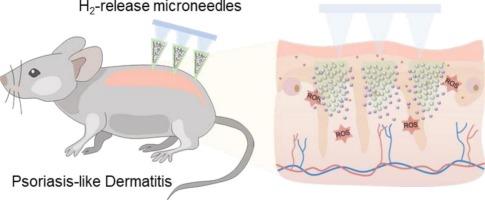Transdermal hydrogen therapy for psoriasis using cavity-embedded double-conical microneedles
IF 11.5
1区 医学
Q1 CHEMISTRY, MULTIDISCIPLINARY
引用次数: 0
Abstract
Psoriasis remains clinically incurable due to its complex etiology. Topical immunosuppressive therapies offer limited effectiveness partly because of poor skin permeability, and can cause severe side effects. To address these challenges, we developed a novel transdermal hydrogen therapy that targets the mutually-reinforcing coupling between oxidative stress and inflammation in psoriasis. Specifically, we designed a double-conical microneedle with high loading capacity and effective skin penetration to efficiently deliver MgH2 powders, enabling the sustained release of molecular hydrogen within the skin tissue. This minimally invasive, self-administrable treatment significantly outperformed calcipotriol cream, a current standard topical therapy. The transdermal hydrogen therapy greatly relieved oxidative damages, pro-inflammatory cytokine expression, immune cell infiltration, and ultimately mitigated keratinocyte hyperproliferation and systemic symptoms. Furthermore, the mechanistic investigations provide valuable insights into psoriasis pathogenesis. More broadly, this study demonstrates a new solution for treating inflammatory skin diseases and a new strategy for microneedle-based transdermal therapeutic delivery.

双圆锥形微针经皮氢疗法治疗银屑病
由于其复杂的病因,银屑病在临床上仍然无法治愈。局部免疫抑制疗法的有效性有限,部分原因是皮肤渗透性差,并可能引起严重的副作用。为了解决这些挑战,我们开发了一种新的透皮氢疗法,针对牛皮癣中氧化应激和炎症之间相互加强的耦合。具体来说,我们设计了一种具有高负载能力和有效皮肤穿透的双锥形微针,以有效地递送MgH2粉末,使分子氢在皮肤组织内持续释放。这种微创,自我给药的治疗明显优于钙三醇乳膏,目前标准的局部治疗。经皮氢疗法可显著减轻氧化损伤、促炎细胞因子表达、免疫细胞浸润,最终减轻角质细胞增生和全身症状。此外,机制研究为银屑病的发病机制提供了有价值的见解。更广泛地说,这项研究展示了治疗炎症性皮肤病的新解决方案和基于微针的透皮治疗递送的新策略。
本文章由计算机程序翻译,如有差异,请以英文原文为准。
求助全文
约1分钟内获得全文
求助全文
来源期刊

Journal of Controlled Release
医学-化学综合
CiteScore
18.50
自引率
5.60%
发文量
700
审稿时长
39 days
期刊介绍:
The Journal of Controlled Release (JCR) proudly serves as the Official Journal of the Controlled Release Society and the Japan Society of Drug Delivery System.
Dedicated to the broad field of delivery science and technology, JCR publishes high-quality research articles covering drug delivery systems and all facets of formulations. This includes the physicochemical and biological properties of drugs, design and characterization of dosage forms, release mechanisms, in vivo testing, and formulation research and development across pharmaceutical, diagnostic, agricultural, environmental, cosmetic, and food industries.
Priority is given to manuscripts that contribute to the fundamental understanding of principles or demonstrate the advantages of novel technologies in terms of safety and efficacy over current clinical standards. JCR strives to be a leading platform for advancements in delivery science and technology.
 求助内容:
求助内容: 应助结果提醒方式:
应助结果提醒方式:


